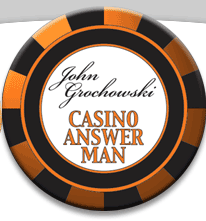Q. What do you think about "free play" instead of cash back on your
rewards cards? The casino where I go has started doing it that way. I
have to play with my rewards. I can't just take the money home.
A. You've mentioned the primary drawback of free play, from a
player's standpoint. From the casino's standpoint, that's the primary
advantage. The casino is rewarding someone who is going to use the money
to play in the casino, and not take it away to spend outside.
Free play is given in a couple of different ways. At some casinos,
separate cards with a magnetic stripe are issued, and those cards are
inserted into the same reader you use for your player rewards card.
Credits are then loaded to the game. Elsewhere, you just place your
rewards card in the reader, and punch in a promotions code to load the
credits.
Given a choice, I'd rather have cash back that I can spend as I
please. Ten dollars in cash is worth more than $10 in free play, where
you're most likely to lose a portion before you can cash out. However,
if the knowledge that the credits are being used for play leads casinos
to give larger rewards, I'm all for it.
If your goal is to take something close to the full amount home, I'd
suggest playing a low volatility game, such as the video poker games
Jacks or Better or Bonus Poker, where two-pair hands pay 2-for-1.
There's no guarantee that you'll still have most of the credits after
you run them through the machine once, but those games give you a better
chance at holding the line than slot machines or more volatile video
poker games do.
Once you've wagered the credits once, you can cash out and take
what's left home if you like. As with any money you have on the machines
or on the tables, there's no requirement that you play. It's your
money, not "theirs," and you can always take it home.
Q. I've enjoyed reading your reports from the gambling show (Global
Gaming Expo) in Las Vegas. Some of the new games sound like a lot of
fun, and I can't wait to try them.
I have a question about staying in Las Vegas. My wife and I are
thinking about going, and everyone tells us someplace different to stay.
Where do you stay, and why?
A. For the Global Gaming Expo, I stayed off the Strip, at Sam's Town off Boulder Highway a few miles east of the Strip, and at the Orleans
on West Tropicana Avenue. Both are locals-oriented places owned by Boyd
Gaming, which in the Midwest operates the Blue Chip in Michigan City,
Ind., and the Par-A-Dice in East Peoria, Ill. I enjoy staying and
playing at the locals-type places, with large selections of video poker games
and good restaurants at reasonable prices.
Most tourists going to Las Vegas will have different priorities than
mine. Especially if it's your first time, you're going to want to spend
time oooooh-ing and aaahhh-ing at the sites of the Strip. I highly
recommend that any Vegas first-timer stay on the Strip. If you have
money to burn, the megaresorts such as Bellagio and Venetian are ultra
upscale luxury hotels. But if you're on a budget, you can spend a lot
less money at the older resorts such as the Flamingo or Tropicana, and
still take in the sights, and check out the shows and designer
restaurants at the newer properties.
If gambling is a priority, and you're looking for the best shot to
win, you'll find better video poker pay tables, better blackjack rules,
better slot paybacks if you get off the Strip. Still, the spectacle of
the Strip, is something that calls for full immersion at least once.
Q. I like to play the keno machines, but my friend says she'll only
play live keno because the house keeps more money on the machines. Is
that right?
A. Per dollar wagered, casinos usually give back more on keno
machines than on the live game. Live games, most common in Nevada, often
return less than 80 percent of money wagered, and even less than 70
percent in some casinos. Keno machines must fulfill the same payback
requirements as slot machines, and in most states that means returns of
at least 80 percent. In Illinois, for example, no electronic gaming
device may return less than 80 percent of wagers to players. In Indiana,
it's 83 percent.
Competitive pressures drive paybacks higher than those state-mandated
minimums. Video keno paybacks in the high 80s and low 90s are common.
Video games move much faster than the live game, however, and make
more money for casinos than live games do. You'll likely get a higher
payback percentage on a video keno game, but your risk per hour will be
much higher.
